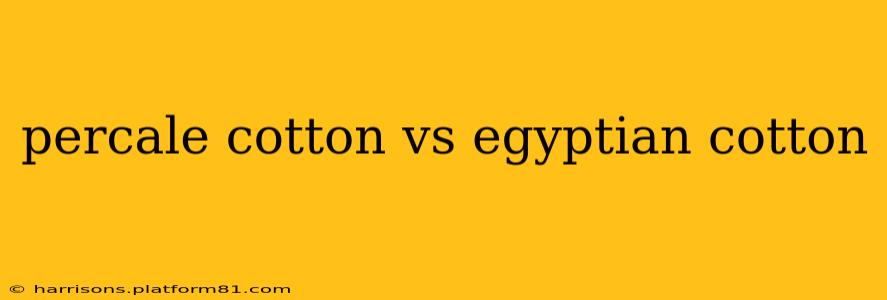Choosing the right bedding can significantly impact your sleep quality and overall comfort. Two popular choices often top the list: percale cotton and Egyptian cotton. While both are luxurious and naturally breathable, they possess distinct characteristics that cater to different preferences. This comprehensive guide will delve into the key differences between percale cotton and Egyptian cotton sheets, helping you make an informed decision for your next bedding purchase.
What is Percale Cotton?
Percale cotton is a type of cotton weave, characterized by its tight, plain weave structure. This creates a crisp, smooth, and slightly less soft feel compared to other cotton weaves like sateen. The tightly woven threads result in a durable fabric that's resistant to wrinkling and pilling, maintaining its crispness even after multiple washes. Many find the coolness and breathability of percale exceptionally comfortable for warmer climates or sleepers who tend to overheat at night.
Advantages of Percale Cotton:
- Crisp and Cool: The tight weave makes percale incredibly breathable and cool to the touch.
- Durable and Long-lasting: Resistant to wrinkling and pilling, percale sheets maintain their quality over time.
- Easy Care: Typically requires less ironing than other cotton types.
- Affordable: Compared to high-thread-count Egyptian cotton, percale can be more budget-friendly.
What is Egyptian Cotton?
Egyptian cotton is renowned for its exceptionally long staple fibers. The length of these fibers is what contributes to the luxurious softness and strength of the fabric. The longer fibers create a smoother, more durable yarn that results in incredibly soft sheets with a silky feel. However, the term "Egyptian cotton" doesn't necessarily guarantee quality. It's essential to understand the thread count and the quality of the cotton itself, as many manufacturers use the term loosely.
Advantages of Egyptian Cotton:
- Exceptional Softness: The long staple fibers contribute to a luxurious, silky-smooth feel.
- Strength and Durability: Resists wear and tear, maintaining its softness and quality over extended use.
- Breathability: Despite its softness, Egyptian cotton is still breathable, offering a comfortable sleep experience.
- Luxurious Feel: Many consider Egyptian cotton sheets the epitome of luxury bedding.
Percale Cotton vs. Egyptian Cotton: A Side-by-Side Comparison
| Feature | Percale Cotton | Egyptian Cotton |
|---|---|---|
| Weave | Tightly woven, plain weave | Varies, often a sateen or similar weave |
| Fiber Length | Typically shorter staple fibers | Long staple fibers |
| Texture | Crisp, smooth, slightly less soft | Soft, silky, luxurious |
| Durability | High, resistant to wrinkles and pilling | High, but can be more prone to wrinkling |
| Breathability | Excellent | Excellent |
| Price | Generally more affordable | Generally more expensive |
| Wrinkling | Minimal | Moderate to High (depending on weave) |
What's the Difference in Thread Count?
Thread count refers to the number of horizontal and vertical threads per square inch of fabric. A higher thread count generally indicates a denser, softer fabric. Both percale and Egyptian cotton can have varying thread counts, influencing the overall feel and price. While a high thread count is often associated with luxury, it doesn't always equate to superior quality. The length and quality of the fibers are equally, if not more, important factors.
Which is Better for Me?
The "better" choice depends entirely on your personal preferences.
- Choose Percale Cotton if: You prefer a crisp, cool, and easy-to-care-for sheet with high durability and a more budget-friendly option.
- Choose Egyptian Cotton if: You prioritize exceptional softness, luxury, and a high-end feel, and are willing to pay a premium price.
Ultimately, the best way to decide is to experience both types of sheets yourself if possible. Consider the climate you live in and your personal preference for texture and feel when making your decision.
